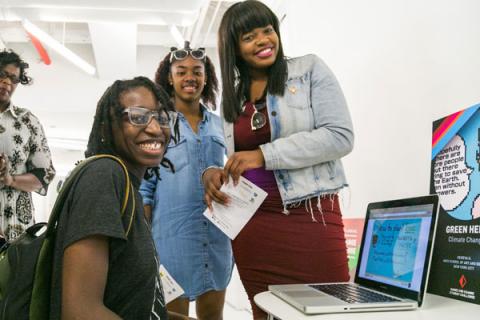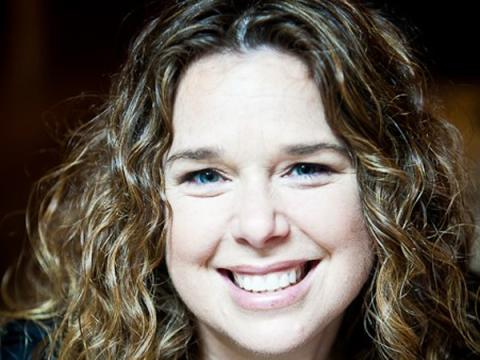
The Student Challenge will be taken up by middle and high school students in New York City and Los Angeles area public schools who'll be tasked with creating these positive-themed games. The best games get promoted at G4C's annual showcase festival in New York each summer.
G4C, which began in 2004, attracts a number of high-profile partners in the pursuit of its positive social goals. This year's partners in its Student Challenge include Annenberg Learner, an organization dedicated to improving teaching methods in American schools; the National Wildlife Federation, which is supporting the wildlife conservation theme; Common Sense Education, which is helping in the news category; and iThrive Games, an empowering game company, and Born This Way Foundation, Lady Gaga's personal charity, which are helping support the kindness theme.
Susanna Pollack, the president of Games For Change, spoke to Samaritanmag about what she hopes students will get out of this experience, how the Student Challenge themes get chosen, and whether or not Lady Gaga might play some of the games herself.
First off, what is Games For Change?
Games For Change is a not-for-profit. We've been around since 2004. And we're the leading global advocate for the power of games as drivers of social impact. We believe you can leverage entertainment and engagement for social good.
Stereotypically, when people think video games, they don't really think about their potential for positive social change. Could you tell us what you're trying to accomplish?
We believe that like other forms of entertainment — movies, television, art — that games are a medium that people not only enjoy for entertainment purposes, but also can be a powerful tool for achieving social good outcomes. So it could be a game that builds awareness around a social issue. It could be about immigration, or about hard issues like sex trafficking. You could have a game that changes behaviour, it could have a game that educates students, that you use in a classroom. It's such a powerful medium that you engage in a different way than you do with other more traditional forms of media. With a game you're given a sense of agency, you can change the outcome of the experience, you role play, you play a character, you make choices. And because of that interaction it's a great medium for exploring issues.
What are some examples of games that have come out of past editions of the Student Challenge?
Each year we identify three themes for students to use as inspiration to design games. And in the past two years we've had themes around climate change, animal welfare, social justice. So one example of a winning game was a concept around animal welfare in New York City. And we had a specific focus on the overpopulation of cats and dogs in New York and it's something as a New Yorker that you see in your community — stray dogs and cats — and we had one middle schooler design a game around homeless dogs and it was called Pup Dash and it was a very personal story of what it would be like if you were a dog lost on the streets of New York and the pitfalls and the hazards you had to avoid. So that type of game helps build empathy for the animals that are unfortunately in this situation. On the other hand, we had a very hard hitting game that was created by a group of high school seniors that was about avoiding the school to prison pipeline, how to make good choices so that you don't fall off track, have to leave school, have to be part of the system. That was a very powerful game that they created.
After students create games, what happens next? Do they reach a level where they could, say, get put in an app store? That sort of thing?
Most of the focus on the challenge is predominantly about process. First, I want to say that the measure of success when we think about students going through this experience, we consider the skills they're learning along the way, both STEM skills (science, technology, engineering, math), their computer science skills, game design skills, 21st century skills like collaboration and critical thinking, that all goes into the process of game making. But to directly to answer the question, we do have platforms for the games that win to live within the Games For Change arcade, because we do have an online arcade where we offer games for the public, and the winning games also participate in an exhibition in each city and we have a ceremony where it acknowledges the winners. In New York we had it at the Museum of Moving Image, we had in Pittsburgh when we had their challenge we had it at the Heinz Art Center. And the winners are also invited to New York City to participate at the Games For Change festival and have their games showcased there.
So is a lot of this about funneling students upwards in the game field?
It is. They're also gaining access to professionals in the field. As part of our program we host game jams and workshops where we invite professional game designers and game students to come and give feedback on the games as they're being developed, to share insights on what career paths there might be, to develop an interest in game development. But also on the content side because kids are making games around the social issues, we also have partners that provide expertise in those themes. So this year for example we're working with the Born This Way Foundation around the theme about kindness and some of the prizes are experiential prizes. So if students are inspired by the themes or build a game around it they have the opportunity to meet others in the field, perhaps have a day of shadowing, and so it very much becomes an opportunity for seeing pathways for the work.
You mentioned Born This Way. How did Games For Change get involved with Lady Gaga's organization?
We start to think about what themes we want them to explore in our challenge each year. We look at what's happening culturally and politically and what issues could be important to use. And we very much felt that an issue around empathy and inclusion and kindness would be something good to use and the Born This Way Foundation is clearly an organization that has done tremendous work in this space and we couldn't think of a better partner to work with. So we reached out to them, and like many other organizations, they saw the value that games have in connecting youth to particular issues.
Is there a chance Lady Gaga might play some of the games that get created this year?
Well that would be amazing if she had time to play some of the games. No guarantees, but certainly she is aware of the work that is happening through the Born This Way Foundation and will engage in the program in some way.
You've mentioned the challenge themes a couple times. How do they get chosen?
We do take a look culturally about what's affecting our society and in particular what's affecting young people. Our program is focused on 13- to 18-year-olds and in the past we've done challenges on climate change, on immigrant experience, and this year there were a couple of themes that emerged that we thought were really worth exploring. One is this theme on kindness, another is a theme on news literacy and helping young people become critical consumers of media with a focus on fake news and how to understand digital privacy. We felt that was an issue that kids are dealing with every day through use of social media and information that's being thrown at them. We thought this would be an interesting issue to explore and we were lucky enough to be working with Common Sense Education in developing this theme. And the third theme is about wildlife conservation and the focus on animals and ecosystems and endangered species and that theme about our shared planet, whether we do a theme on climate change or wildlife, it's a theme that connects with kids.
What do you hope participants get out of these challenges?
I guess at a high level I hope that participants see the potential games have beyond just being fun and they seek out other games that add value to their world and not just see it as a form of entertainment. But also hopefully it's inspiring young people who are looking for a career path that's creative and promising but also has some kind of civic, social relevance to the world. That's the best bottom line to look for — that we're encouraging civic citizens, world citizens that want to make this world a better place in anything they do.
Air Jordan